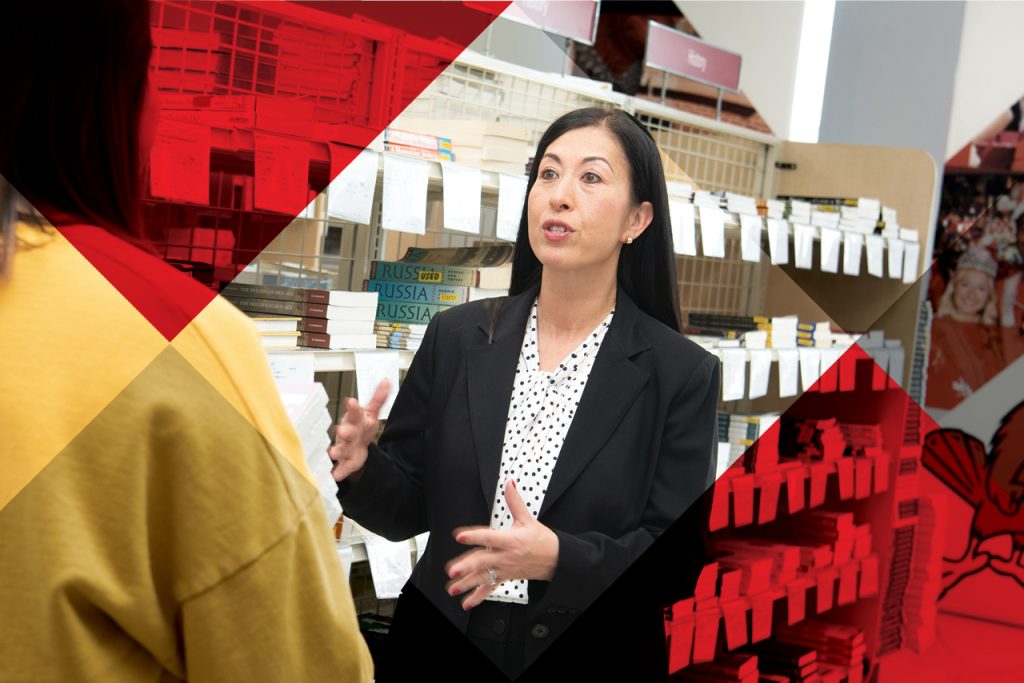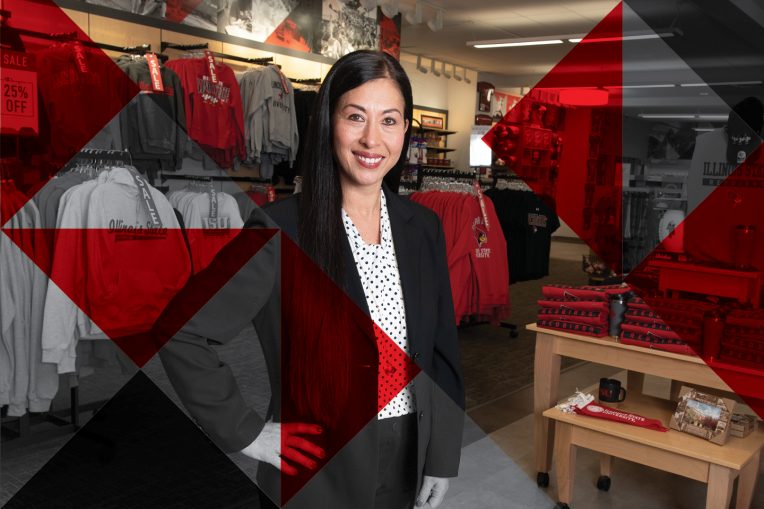Sandy Shelton would seem to have reason to worry.
The 1990 Family and Consumer Sciences graduate has built her career in retail operations, gaining expertise in marketing, profit and loss management, and operations while overseeing millions in merchandise for some of the nation’s most successful retail chains. Among them is JCPenney—Shelton’s first employer—which shuttered hundreds of its stores on its way to declaring bankruptcy last year.
The scenario has become all too familiar in recent months. There were 29 retailers filing under Chapter 11 during the first eight months of 2019, which was the same year 9,500 stores closed. Many of those were mall anchors such as Macy’s, Sears, and Neiman Marcus.
The past year was equally brutal. Retailers faced a rapid and steep decline in foot traffic during the pandemic. More chains disappeared, including Pier 1, Tuesday Morning, and Men’s Warehouse. Other corporations such as the parent company for Bed Bath & Beyond worked to remain afloat by shuttering storefronts. Mom and pop businesses faced an even tougher fight to keep their doors open.
Appears InStaying in such a profession when stores are rapidly closing across the country does not trouble Shelton. While well aware of the shifting shopping paradigm that has been exacerbated with the onset of the coronavirus (COVID-19), she remains enthusiastic and optimistic about the future of retail.
“Brick and mortar stores were already struggling and anchor chains already downsizing. COVID-19 just forced the accelerated strategy to rightsize the number of stores that were starting to be reduced,” said Shelton, who is a regional manager for Barnes & Noble College. She notes that some mall spaces continue to see prolonged vacancies due to rising rent. The high price to stay in such a location makes no sense when little remains to draw consumers.
“People are not going to malls as they did in the 1980s and 1990s. Then it was a place to gather socially, meet friends, and shop all day,” Shelton said, reflecting on how in the past people of all ages enjoyed browsing and stopping in the food court. “Now shoppers want diversity. They want to get in and get out quickly, and the strip malls provide that convenience factor. Today, along with your retail, you can most likely find a gym, spas, bowling alleys, medical facilities, and plenty of accessible parking.”
The desire for fast and easy shopping has been further confirmed with the skyrocketing rise in online purchasing, especially during the prolonged presence of COVID-19. “Retailers that already had a strong e-commerce platform in place are those that have been doing well. The pandemic did not affect their business other than to propel it forward,” Shelton said, cautioning that stores must continually emphasize and enrich the online aspect of their sales to thrive.
Providing an omni-channel experience is what the consumer desires. Being able to offer in-store, online or curbside service has allowed companies like Barnes & Noble College to be able to deliver the quality of service customers expect, especially during these challenging times.
“Sometimes the best laid plans end up being even better once revised.”
Sandy Shelton
Understanding the shopping experience consumers desire and knowing how to provide it is a skill Shelton has mastered since completing her fashion merchandising degree. Born in South Korea and raised in Chicago, she enrolled at Illinois State excited to become her family’s first college graduate. She appreciated faculty who helped her grasp the business and psychology aspects of retail.
“My professors laid a great foundation for my career,” said Shelton, who joyfully reconnected with many of them during her induction to the College of Applied Science and Technology Hall of Fame in 2019. She credits them for instilling the knowledge and confidence needed as she found her niche in the retail world that she entered through an ISU job fair.
Shelton attended the Career Services event in the Bone Student Center during her junior year to gain interviewing experience and explore employment opportunities. She connected with a JCPenney recruiter who was hiring only seniors. She went back the following year and ironically enough the same representative was attending the job fair.
“I knew I wanted a career with JCPenney so I marched right up to him and said, ‘I’m a senior now and I want to work for your company.’ I went through the interviewing process and was hired. Thirty years later, I still have my offer letter with the starting salary.”
The job as a merchandise manager was secured before Shelton graduated. She worked at the Bloomington store and in Chicago as a merchandise buyer for the shoe, jewelry, women’s, and children’s departments.
Shelton shifted in 1996 to Kohl’s, which recruited her as the chain was growing beyond the Midwest. She went from an assistant store manager role for the company to become a district manager in 2005, leading 20 suburban Chicago stores with a collective annual sales volume of $200 million.
“I learned a tremendous amount operationally, from starting a store from scratch to renovating a building and opening a store,” said Shelton, who mastered understanding and valuing the importance of teamwork, managing a budget, and merchandising a store. “I learned that success is not about you. It’s about how successful the people around you are and it’s about the shopping experience you provide for the customer.”
She knows consumers want a clean and neat environment coupled with friendly and capable employees. She continues to focus on maintaining both in her role at Barnes & Noble College. Shelton shifted to the company in 2008 and now oversees accounts on 50 campuses, including Illinois State.
It is a point of pride for her to be back at the University where her professional journey began and specifically the building where her dreams were launched, as the ISU store is inside the student center.

Shelton has the same enthusiasm and excitement for her work today as she did upon graduation and is ready for the next chapter as she flexes with the industry she loves.
“Everything is shifting in our lives, including the retail world. The question becomes what does the e-commerce platform look like. Consumers still want the whole shopping experience, so we need fluidity through all the different channels—from in store to online or through a mobile app and curbside pick up,” said Shelton, who thrives on providing customers exceptional service.
“My job is to figure out how I am going to create that shopping experience, knowing that the plan will change day to day and sometimes a dozen times in a day. I’ve learned that’s OK. Sometimes the best laid plans end up being even better once revised.”

